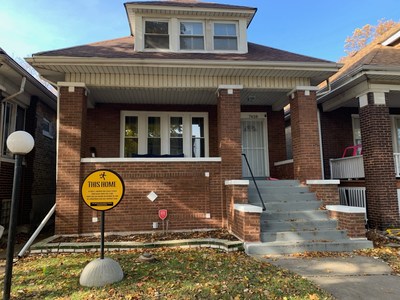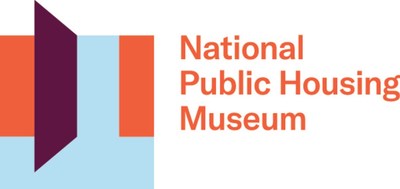|
16.02.2022 19:22:00
|
Inequity for Sale: National Public Housing Museum Exhibit Explores Englewood's Land Sale Contracts and Segregation
CHICAGO, Feb. 16, 2022 /PRNewswire/ -- A groundbreaking exhibition sponsored by the National Public Housing Museum, the nation's first cultural institution dedicated to interpreting the American public housing experience, sheds new light on an unsavory Chicago real estate practice in the '50s and '60s: Selling homes to Black families using Land Sale Contracts, which imposed excessive monthly payments on buyers—many of whom lost their properties. LSCs bred segregation and redlining, cheating families out of equity built through home ownership.
"Inequity for Sale" was created by visual artist and NPHM 2021 Artist As Instigator
Tonika Lewis Johnson to tell the often-ignored story of Land Sale Contracts, which arose as alternatives to traditional lending in Chicago when banks denied Black families loans and shut them out of home ownership. Even Federal Housing Administration-guaranteed mortgages were unavailable to prospective Black buyers.
Due to Land Sale Contracts, an estimated $3.2 billion to $4.0 billion was expropriated from the Black community during the period between 1950 and 1970, according to a 2018 Duke University study. The study, "The Plunder of Black Wealth in Chicago," found that 60,100 homes were purchased through LSCs by Black buyers during that period.
"Inequity For Sale" kicks off in Chicago's Englewood during Black History MonthLaunching February 18 to coincide with Black History Month, "Inequity for Sale" will feature sculptural concrete and metal markers, each over five-feet-high, in front of Land Sale Contract homes in Englewood, one at 6823 S. Aberdeen St. and the other at 7230 S. Green St. Additional property markers will be added in the spring, and a walking tour of Englewood's Land Sale Contract homes is planned using the interactive VAMONDE phone app. It will connect the area's history with Englewood's present-day conditions.
"Many of these once-beautiful homes are now dilapidated or abandoned, visible proof of the sordid legacy of Land Sale Contracts," Lewis Johnson said. "Having people walk through Englewood and see these properties allows them to interact with the destructive nature of Chicago's history of redlining and segregation. It's a powerful experience."
"The 'Inequity for Sale' project is exactly the kind of historical exhibit that can be a catalyst for real change in the 21st century," NPHM Executive Director Lisa Yun Lee, Ph.D. said. "By documenting the intersection of racial injustice with the right to homeownership, the exhibition tells a vivid and poignant story that has been largely neglected for decades."
Land Sale Contracts' shameful legacy stole billions of dollars from the Black community
Land Sale Contracts were offered to prospective Black homeowners who were not able or allowed to qualify for traditional mortgages. The contracts allowed them to rent the homes with the hopes of buying them, but came with inordinately high monthly payments. When Black families could not make payments, which was usually inevitable due to the loan's prohibitive rates, they were evicted by the sellers without recourse and lost the homes and payments. As a result, contract holders were unable to build equity in the properties or own them outright.
The Land Sale Contracts executed during the '50s and '60s gained momentum amid a robust postwar U.S. housing boom, when many white families bought homes in mostly white neighborhoods with the help of VA home loans provided by the G.I. Bill. Those VA loans did not exclude Black borrowers, but the loans were administered by banks that often practiced redlining, which limited access to mortgages in Black neighborhoods.
The practice came to an end with the 1968 Fair Housing Act that prohibited discrimination in the sale, rental and financing of housing based on race, religion, national origin or sex. However, the impact of Land Sale Contracts continues to be felt today in Chicago's still segregated neighborhoods and the large wealth gap between the city's Black and white residents.
Lewis Johnson, co-founder of the Resident Association of Greater Englewood (R.A.G.E.), is widely known for her Folded Map project, which has engaged residents from both the South and North Sides of Chicago to explore the impact of segregation. The project paired residents from one side of the city with residents with corresponding addresses on the other side to compare and document their experiences of growing up and living in their respective neighborhoods. The stunning discrepancies between each group's outcomes have made the project a foundational and iconic work on redlining and segregation.
Lewis Johnson also is the co-host of a three-part podcast series based on the project, along with NPHM's Program Director of Arts, Culture and Public Policy Tiff Beatty, titled "Legally Stolen," which launched in December 2021. The first two episodes can be downloaded here.
About the National Public Housing Museum: The NPHM is the first cultural institution in the United States dedicated to interpreting the American experience in public housing. Its mission is to preserve, promote and propel the right of all people to a place where they can live and prosper—a place to call home. Using art, oral histories and material culture, the Museum will archive and share public housing stories of hope and personal achievement, as well as stories of struggle, resistance and resilience. These stories create opportunities for visitors to understand and engage in innovative public policy reform to reimagine the future of our communities, our society and the places we call home. Its physical structure is currently in development and will be an adaptive reuse of the last remaining building of the former Jane Addams Homes on Chicago's Near West Side. When completed, visitors will interface with compelling, historically significant exhibits and engage with the provocative ideas of internationally renowned contemporary artists.
Media Contact:
Beshanda Owusu
bowusu@purposebrand.com
773-398-9194
![]() View original content to download multimedia:https://www.prnewswire.com/news-releases/inequity-for-sale-national-public-housing-museum-exhibit-explores-englewoods-land-sale-contracts-and-segregation-301483976.html
View original content to download multimedia:https://www.prnewswire.com/news-releases/inequity-for-sale-national-public-housing-museum-exhibit-explores-englewoods-land-sale-contracts-and-segregation-301483976.html
SOURCE National Public Housing Museum
 Der finanzen.at Ratgeber für Aktien!
Der finanzen.at Ratgeber für Aktien!
Wenn Sie mehr über das Thema Aktien erfahren wollen, finden Sie in unserem Ratgeber viele interessante Artikel dazu!
Jetzt informieren!

